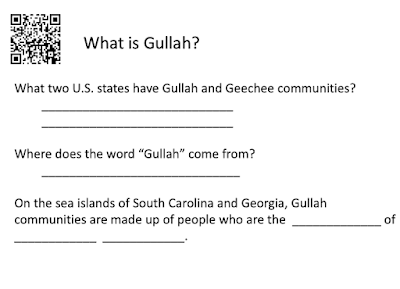We had a particularly tough group that year, and were definitely in survival mode, even though there were two of us in the classroom. The school had just purchased a class set of iPods and no one else was using them yet, so using the technology seemed like the perfect hook.
The overall plan was to look into the cultural connections between Gullah music, which originated right near us on the sea islands of South Carolina and Georgia, and the blues. We wanted the students to have some historical knowledge, but also some experience listening to and singing the music from both genres.
Step 1 Research
What did we want the students to know about Gullah music? We created a knowledge-seeking worksheet based on information found on the wonderful Gullah Music section of www.knowitall.org. The fun part of this is using the QR codes to "magically" open the correct website. A simple Google search will pull up many QR code generators. We used the one at http://qrcode.kaywa.com/. Here is a sample section of our worksheet:https://www.knowitall.org/series/gullah-culture
Remember those tough 5th graders?
Not a peep as they were totally engaged in the fact finding activity!
After developing the rubric, we listened to several YouTube videos of Yonder Come Day sung by Gullah Singers and several school choirs. Students were more engaged in the listening because they knew something of the culture from their QR research, and they knew what they should be listening for musically because they developed the rubric. It was easy to discuss each video using musical terms and historical facts.
Hearing the song repeated several times also prepared the students to sing it. Of course, they also had to rate their own performance using the same rubric that they developed for the YouTube videos!
Look for the next steps, performance evaluation using the iPods and Google Forms, in this post: Tech Talk Tuesday - iPods as Assessment Tools
Remember those tough 5th graders?
Not a peep as they were totally engaged in the fact finding activity!
Step 2 Listen and Sing
Next, we engaged the students in a discussion of what makes a singing performance a good performance, creating lists in the board of various attributes and then specifying the criteria for excellence. Some of the attributes were singing voice, rhythmic accuracy, tempo, and expression. They were creating a rubric and they didn't even realize it!After developing the rubric, we listened to several YouTube videos of Yonder Come Day sung by Gullah Singers and several school choirs. Students were more engaged in the listening because they knew something of the culture from their QR research, and they knew what they should be listening for musically because they developed the rubric. It was easy to discuss each video using musical terms and historical facts.
Hearing the song repeated several times also prepared the students to sing it. Of course, they also had to rate their own performance using the same rubric that they developed for the YouTube videos!
Sharing Our Project
The QR worksheets, links, Yonder Come Day videos and our presentation slides from SCMEA can be found here:Look for the next steps, performance evaluation using the iPods and Google Forms, in this post: Tech Talk Tuesday - iPods as Assessment Tools
Interested in Gullah Culture?
SCETV has a wonderful set of resources for elementary students. I hope you will look them over!














.png)


Oh my goodness, this is fantastic! I really need to get on this QR bandwagon. I think the students would love it. Thanks for sharing these great ideas! #fermatafridays
ReplyDelete